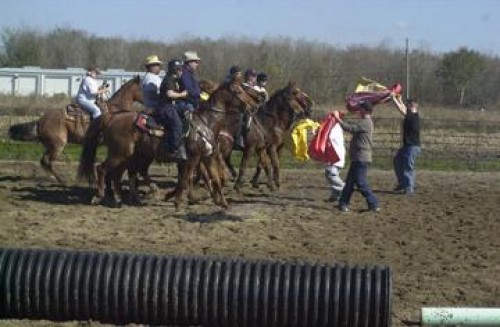
Wilburn "Gene" Brossette
February 7, 2007Joy Theriot
February 12, 2007Typically when umbrellas and raincoats are used, it means bad weather has arrived. But for the Mounted Patrol Section of the Lafourche Parish Sheriff’s Office, umbrellas and raincoats are all a part of training for “the greatest free party on Earth”—Mardi Gras.
While parade-goers see police patrolling parade routes on horseback, they do not see the extensive training—for both officers and horses—that goes on behind the scenes.
“You have to have total control of your horse,” said Deputy Tommy Blanchard, who has trained horses for 40 years. “So we do a lot of precision riding. We try to simulate what we may run into on the streets, but instead of people, we use little obstacles.”
Obstacles? “The lights, sirens, gun fire, loud noises, waving rain coats and umbrellas,” explained Blanchard. “Anything that you may see at a parade.”
Last week officers from the Thibodaux Police Department and West Baton Rouge Parish took part in two eight-hour training camps to prepare the officers and horses for crowd control. “Just to reinforce our training from previous years on approach and apprehension,” Blanchard said of the two-day training camp. “Getting the horses used to the crowd control and the noises that you run into for Carnival.”
He added that most other areas in the state have implemented mounted patrol officers into crowd-control situations.
Blanchard says training is done twice a month, for eight hours each. “Most of these officers in Lafourche Parish have never ridden before,” he said. “It makes it a little easier because they haven’t developed the bad habits. We try to get everybody to ride the same way. That way all these horses and riders are interchangeable.”
Statistics show that the training seems to be working. Lafourche Parish has used mounted patrol officers at parades since 2000, and for last year’s parades there was just one fight in areas mounted patrol officers were located. “They usually kind of put us in the known areas that may have trouble,” said Blanchard. “Last year, we had one fight in the whole parish. Where we are, there’s nothing going on.”
Part of the reason for that is simple—intimidation.
According to Blanchard, a trained officer on a trained horse can do the work of 15 ground officers. “You have the height advantage,” he said. “You can see trouble, and maybe stop it before it gets out of hand. It’s a great crime deterrent. They see you because you’re eight-feet in the air. They can see you, and that may change their minds about causing any trouble.”
A big reason for that, Blanchard says, is that officers are able to approach and apprehend offenders without ever having to get off the horse.
“The officers need to be trained to first of all stay on (the horse) in a difficult situation,” he said. “When you’re in a crowded situation, you have to have control of the horse where they won’t spin around and step on anyone.
“We like to stay on the outside perimeter of parades, fairs, festivals, football games … and from our height advantage, we can see any trouble that’s starting to happen.”








